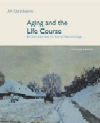- Go to the website (http://www.aifs.org.au/)
and link to Research Program, then Projects and Publications, 1996-1998. Read
the article "Life Course of Australian Families" and answer the
following questions:
- What was the purpose of the longitudinal study described in this article?
- How were the data obtained?
- What were some of the research issues addressed in this study?
- Why do you think studies that examine changes in the life course important?
2. Most people expect that by the time they retire, they will no longer have
young children in their homes. Yet today, more grandparents are raising their
grandchildren than ever before. To see what the Administration on Aging (http://www.aoa.gov/)
thinks about this trend, go to the AoA's website, link to AoA Fact Sheets, and
select and read the article "Grandparents Raising Grandchildren."
Then answer the following questions: - According to the U.S. Census Bureau, how many children lived in homes maintained
by their grandparents in 1997?
- How does the figure for 1997 compare to that for 1970?
- What percentage of grandparents caregivers are between the ages of 50 and
64? What percentage are age 65 or older?
Discuss some of the problems faced by grandparents who are raising their grandchildren. 3. The Mesa Community College in Mesa Arizona (http://www.mc.maricopa.edu/academic/psychology/)
offers a student newsletter through its psychology department. Go to the site
and read an article on the empty nest syndrome. From the homepage, click on
"Netletter." Then click on "Developmental Psychology Student
Netletter." Scroll down and click on "Middle Adulthood." Scroll
down again and click on "Intimacy, Marriage, and Family." Now click
on "Empty Nest Syndrome" and answer the following questions: - How does John Sandtrocks define the empty nest syndrome in his book, Life-Span
Development?
- What are some ways to help overcome feelings of loss, depression, and loneliness?
- Why is it becoming more common for the empty nest to be refilled?
- After reading the article, discuss with your parents whether they experienced
the empty nest syndrome when you left home to go to college. If they did,
how did they cope?
4. Family Discussions (http://www.familydiscussions.com/bibliography.htm)
provides a good source of books on aging and the relationships between generations.
Click on "Titles." Click on the first title, "Aging and Generational
Relations Over the Life Course: A Historical and Cross-Cultural Perspective,"
by Tamara Hareven. Then scroll down to the Outline and click on "Retirement,
Inheritance, and Generational Relations: Life Course Analysis in Historic Eastern
Europe." Read the article and answer the following questions: - What does the life-course perspective assume, according to the author?
- What is the western concept of "retirement?"
Go back to the main menu and, under Outline, click on "The Well-Being
of Aging Americans With Very Old Parents." Read this article and answer
the following questions: - What are some of the major changes that occur approximately two-thirds of
the way through the life span?
- What do Americans over age 55 with living parents have in common?
|



 2002 McGraw-Hill Higher Education
2002 McGraw-Hill Higher Education